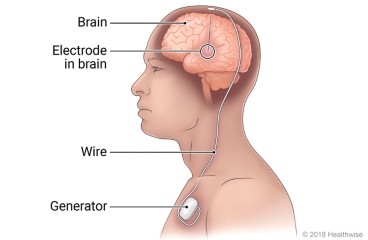
What is deep brain stimulation surgery?
Deep brain stimulation (DBS) uses electrical pulses to stimulate an area of the brain. This can change the activity in that area of the brain. You may need two surgeries to implant the devices that stimulate the brain.
Most often, DBS is used to relieve symptoms of Parkinson's disease when they can't be controlled by medicines. But it can also be used for other conditions, such as multiple sclerosis and obsessive-compulsive disorder.
The devices are often put in during separate surgeries on different days. Your doctor will drill small holes in your skull. Then tiny wire electrodes are placed in your brain. You may or may not be awake during the surgery. If you're awake, you will help the doctor know where to place the electrodes where they will work best. If you're not awake, your doctor might use a type of imaging (MRI) to help place the electrodes.
It may seem scary to be awake during this surgery. But your scalp will be numb. You won't feel any pain. You will stay in the hospital for a day or two after this surgery.
The other step is to put in a small, battery-powered generator. It's placed under the skin of your chest near your collarbone. This device is connected to the electrodes in your brain. To do this, the doctor will use a small wire that runs under your scalp and skin. You won't be awake for this surgery.
After the surgery, you will have a short hospital stay. Your doctor may wait for you to heal before turning on the generator.
How do you prepare for surgery?
Surgery can be stressful. This information will help you understand what you can expect. And it will help you safely prepare for surgery.
 Preparing for surgery
Preparing for surgery
- Be sure you have someone to take you home. Anesthesia and pain medicine will make it unsafe for you to drive or get home on your own.
- Understand exactly what surgery is planned, along with the risks, benefits, and other options.
- Tell your doctor ALL the medicines, vitamins, supplements, and herbal remedies you take. Some may increase the risk of problems during your surgery. Your doctor will tell you if you should stop taking any of them before the surgery and how soon to do it.
- If you take a medicine that prevents blood clots, your doctor may tell you to stop taking it before your surgery. Or your doctor may tell you to keep taking it. (These medicines include aspirin and other blood thinners.) Make sure that you understand exactly what your doctor wants you to do.
- Make sure your doctor and the hospital have a copy of your advance directive. If you don't have one, you may want to prepare one. It lets others know your health care wishes. It's a good thing to have before any type of surgery or procedure.
What happens on the day of surgery?
- Follow the instructions exactly about when to stop eating and drinking. If you don't, your surgery may be canceled. If your doctor told you to take your medicines on the day of surgery, take them with only a sip of water.
- Follow your doctor's instructions about when to bathe or shower before your surgery. Do not apply lotions, perfumes, deodorants, or nail polish.
- Do not shave the surgical site yourself.
- Take off all jewelry and piercings. And take out contact lenses, if you wear them.
 At the hospital or surgery center
At the hospital or surgery center
- Bring a picture ID.
- The area for surgery is often marked to make sure there are no errors.
- Your head will be secured in a metal frame to keep it still during surgery. You may have an imaging test (MRI) while your head is in the frame. It helps the doctor find the right area of your brain.
- You will be kept comfortable and safe by your anesthesia provider. The anesthesia may make you sleep. Or it may just numb the area being worked on.
- The surgery will take about 3 to 4 hours.
When should you call your doctor?
- You have questions or concerns.
- You don't understand how to prepare for your surgery.
- You become ill before the surgery (such as fever, flu, or a cold).
- You need to reschedule or have changed your mind about having the surgery.
Where can you learn more?
Go to http://www.healthwise.net/patientEd
Enter D125 in the search box to learn more about "Deep Brain Stimulation (DBS): Before Your Surgery".
Current as of: December 3, 2024
Author: Ignite Healthwise, LLC Staff
Clinical Review Board
All Ignite Healthwise, LLC education is reviewed by a team that includes physicians, nurses, advanced practitioners, registered dieticians, and other healthcare professionals.

